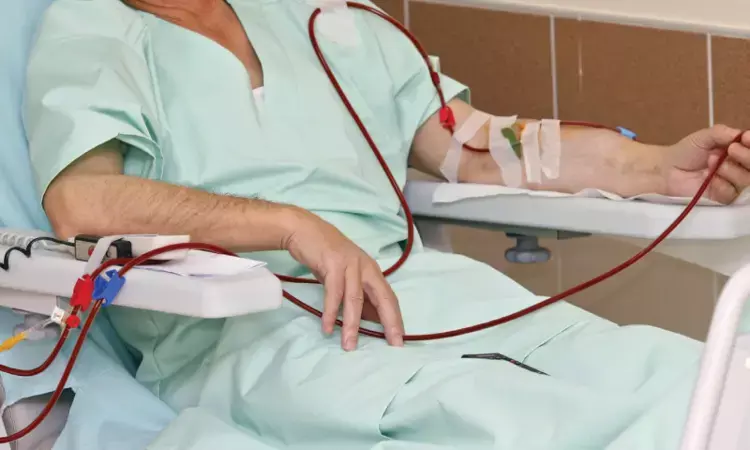- Home
- Medical news & Guidelines
- Anesthesiology
- Cardiology and CTVS
- Critical Care
- Dentistry
- Dermatology
- Diabetes and Endocrinology
- ENT
- Gastroenterology
- Medicine
- Nephrology
- Neurology
- Obstretics-Gynaecology
- Oncology
- Ophthalmology
- Orthopaedics
- Pediatrics-Neonatology
- Psychiatry
- Pulmonology
- Radiology
- Surgery
- Urology
- Laboratory Medicine
- Diet
- Nursing
- Paramedical
- Physiotherapy
- Health news
- Fact Check
- Bone Health Fact Check
- Brain Health Fact Check
- Cancer Related Fact Check
- Child Care Fact Check
- Dental and oral health fact check
- Diabetes and metabolic health fact check
- Diet and Nutrition Fact Check
- Eye and ENT Care Fact Check
- Fitness fact check
- Gut health fact check
- Heart health fact check
- Kidney health fact check
- Medical education fact check
- Men's health fact check
- Respiratory fact check
- Skin and hair care fact check
- Vaccine and Immunization fact check
- Women's health fact check
- AYUSH
- State News
- Andaman and Nicobar Islands
- Andhra Pradesh
- Arunachal Pradesh
- Assam
- Bihar
- Chandigarh
- Chattisgarh
- Dadra and Nagar Haveli
- Daman and Diu
- Delhi
- Goa
- Gujarat
- Haryana
- Himachal Pradesh
- Jammu & Kashmir
- Jharkhand
- Karnataka
- Kerala
- Ladakh
- Lakshadweep
- Madhya Pradesh
- Maharashtra
- Manipur
- Meghalaya
- Mizoram
- Nagaland
- Odisha
- Puducherry
- Punjab
- Rajasthan
- Sikkim
- Tamil Nadu
- Telangana
- Tripura
- Uttar Pradesh
- Uttrakhand
- West Bengal
- Medical Education
- Industry
Dietary potassium not tied to hyperkalemia in hemodialysis patients: DIET-HD study

Australia: According to a recent study, higher dietary intake of potassium in patients receiving maintenance hemodialysis (HD) is not associated with hyperkalemia or death. The findings of the study were presented at the Kidney Week 2020 Reimagined, a virtual meeting of the American Society of Nephrology.
Dietary modification is a standard practice in people undergoing HD in order to reduce the risk of hyperkalemia and is commonly recommended in guidelines despite a lack of evidence. A diet low in potassium may impair nutritional status and quality of life. Amelie Bernier-Jean, School of Public Health, Faculty of Medicine and Health, The University of Sydney, Sydney, New South Wales, Australia, and colleagues therefore aimed the association between dietary potassium intake and mortality and whether hyperkalemia mediates this association in the international DIET-HD study.
The researchers recruited 9690 adults undergoing maintenance hemodialysis in Europe and South America, 1647 were excluded for lack of data-linkage identifier or incomplete or implausible dietary assessment. Baseline potassium intake was measured from the GA2LEN food frequency questionnaire and performed time-to-event and mediation analyses.
The median dietary potassium intake at baseline was 3.5 g/day.
The research yielded the following findings:
- During a median follow-up of 3.97 years (25,890 person-years), 2921 (36%) deaths were observed including 1316 (45%) from cardiovascular causes.
- After adjusting for baseline characteristics including presence of cardiac disease and food groups, dietary potassium intake was not associated with all-cause mortality.
- A mediation analysis showed no association of potassium intake with mortality either through or independent of serum potassium.
- Higher potassium intake was not associated with higher serum potassium (B=0.04 mEq/L) or the prevalence of hyperkalemia (≥ 6.0mEq/L) at baseline (OR=1.08).
- Hyperkalemia was associated with cardiovascular death (HR=1.23).
To sum up, higher dietary intake of potassium is not associated with hyperkalemia or death in patients treated with maintenance hemodialysis.
Reference:
Bernier-Jean A, Wong G, Saglimbene VM, et al. Dietary potassium intake and all-cause mortality in adults undergoing hemodialysis: the DIET-HD cohort study. Presented at: Kidney Week 2020 Reimagined, October 19-25, 2020. Poster PO1140.
Dr Kamal Kant Kohli-MBBS, DTCD- a chest specialist with more than 30 years of practice and a flair for writing clinical articles, Dr Kamal Kant Kohli joined Medical Dialogues as a Chief Editor of Medical News. Besides writing articles, as an editor, he proofreads and verifies all the medical content published on Medical Dialogues including those coming from journals, studies,medical conferences,guidelines etc. Email: drkohli@medicaldialogues.in. Contact no. 011-43720751


